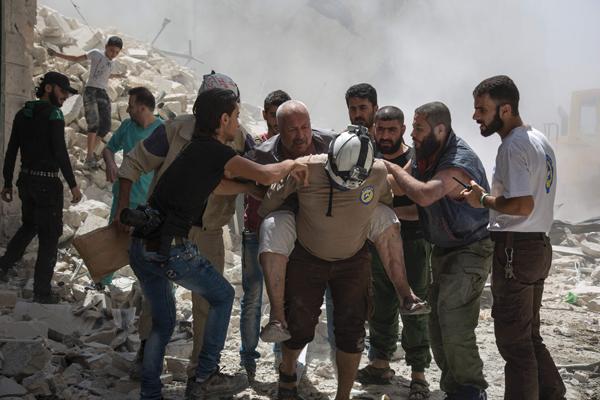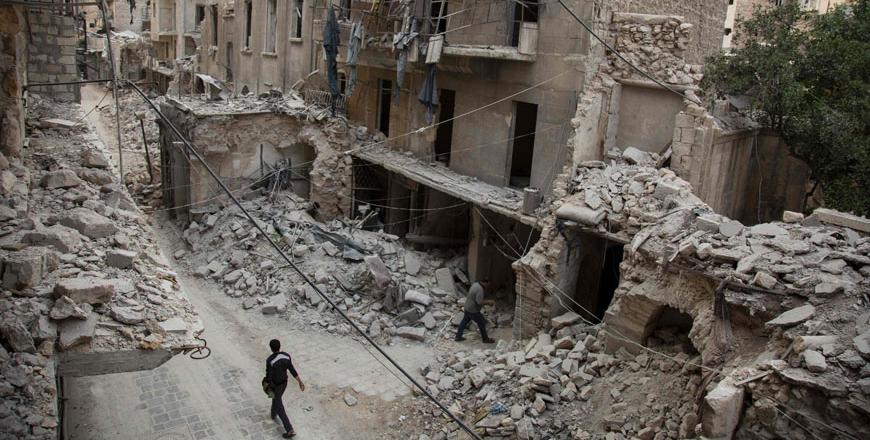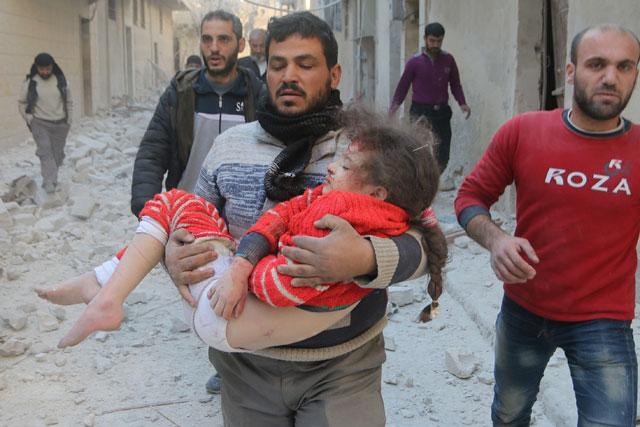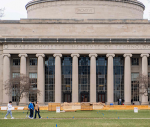You are here
Syrian army threatens to encircle Aleppo as talks falter
By Reuters - Feb 03,2016 - Last updated at Feb 03,2016
BEIRUT/AMMAN/GENEVA — A Syrian military offensive backed by heavy Russian air strikes threatened to cut critical rebel supply lines into the northern city of Aleppo on Tuesday while the warring sides said peace talks had not started despite a UN statement that they had.
UN envoy Staffan de Mistura announced the formal start on Monday of the first attempt in two years to negotiate an end to a war that has killed 250,000 people, caused a refugee crisis in the region and Europe and empowered Daesh militants.
But both opposition and government representatives have since said the talks had not in fact begun and fighting on the ground raged on without constraint.
The opposition cancelled a meeting with de Mistura on Tuesday afternoon, and issued a statement condemning "a massive acceleration of Russian and regime military aggression on Aleppo and Homs", calling it a threat to the political process.
Rebels described the assault north of Aleppo as the most intense yet. One commander said opposition-held areas of the divided city were at risk of being encircled entirely by the government and allied militia, appealing to foreign states that back the rebels to send more weapons.
The main Syrian opposition council said after meeting de Mistura on Monday it had not and would not negotiate unless the government stopped bombarding civilian areas, lifted blockades on besieged towns and released detainees.
The head of the Syrian government delegation also denied talks had started after discussions with de Mistura on Tuesday.
Bashar Al Ja’afari said after two and a half hours of talks that the envoy had yet to provide an agenda or list of opposition participants. “The formalities are not yet ready,” he told reporters at the United Nations office in Geneva.
He also said that if the opposition “really cared” about the lives of Syrians it should condemn the killing of more than 60 people on Sunday by Daesh bombers in a neighbourhood that is home to the country’s holiest Shiite shrine.
A UN source said de Mistura had promised to present an opposition delegation list by Wednesday. Its makeup is subject to fierce disagreements among the regional and global powers that have been drawn into the conflict.
The refugee crisis and spread of the Daesh terror group through large areas of Syria, and from there to Iraq, has injected a new urgency to resolve the five-year-old Syria war.
But the chances of success, always very slim, appear to be receding ever more as the government, supported by Russian air strikes, advances against rebels, some of them US-backed, in several parts of western Syria where the country’s main cities are located.
‘Decisive battle’
The attack north of Aleppo that began in recent days is the first major government offensive there since the start of Russian air strikes on September 30.
The area is strategic to both sides. It safeguards a rebel supply route from Turkey into opposition-held parts of the city and stands between government-held parts of western Aleppo and the Shiite villages of Nubul and Al Zahraa which are loyal to Damascus.
“The supply routes were not cut but there is heavy bombardment of them by the jets,” said a commander in the Levant Front rebel group who gave his name as Abu Yasine. “The Russian jets are trying to hit headquarters and cut supply routes.”
The Russian jets had been working “night and day” for three days, he added, and reiterated the rebels’ long-held demand for anti-aircraft missiles to confront the assault.
“If there is no support, the regime could besiege the city of Aleppo and cut the road to the north,” said Abu Yasine, whose group is one of the rebel movements that have received military support from states opposed to Assad, funnelled via Turkey.
Advancing government forces seized the village of Hardatnin some 10km northwest of Aleppo, building on gains of the previous day, said the Syrian Observatory for Human Rights, a UK-based monitoring body. Syrian state media also reported the advance.
Another rebel commander said he had sent reinforcements to the area. “We sent new fighters this morning, we sent heavier equipment there. It seems it will be a decisive battle in the north, God willing,” said Ahmed Al Seoud, head of a Free Syrian Army group known as Division 13. “We sent TOW missile platforms. We sent everything there,” he told Reuters.
US-made TOW missiles, or guided anti-tank missiles, are the most potent weapon in the rebel arsenal and have been supplied to vetted rebel groups as part of a programme of military support overseen by the Central Intelligence Agency.
But while they have helped rebels to slow advances on the ground, they are of little use against fighter bombers.
The Russian intervention has reversed the course of the war for Damascus, which suffered a series of major defeats to rebels in western Syria last year before Moscow deployed its air force as part of an alliance with Iran.
In an interview with Reuters, British Foreign Secretary Philip Hammond said Russian President Vladimir Putin was undermining international efforts to end the war by bombing opponents of Daesh in an attempt to bolster Assad.
Opposition wary of envoy
“The Russians say let’s talk, and then they talk and they talk and they talk. The problem with the Russians is while they are talking they are bombing, and they are supporting Assad,” Hammond said.
Russia’s Foreign Ministry said Hammond was spreading “dangerous disinformation”, while the Kremlin said his statements could not be taken seriously.
Western states opposed to Assad, including the United States and Britain, piled pressure on the opposition to attend the Geneva talks which have been beset by problems including a row over who should be invited to negotiate with Damascus.
The opposition says talks are impossible without a halt to bombing, release of prisoners and lifting of sieges to allow humanitarian aid to reach blockaded civilians.
“Nothing has changed in the situation on the ground. So as long as the situation is like this we are not optimistic,” opposition negotiator Mohamad Alloush told reporters. “There are no good intentions from the regime’s side to reach a solution.”
De Mistura said on Monday the responsibility of agreeing ceasefires across Syria lay with major powers and that his remit was only to hold talks on a UN resolution on elections, governance and a new constitution.
Related Articles
GENEVA — The UN’s Syria envoy voiced hope Tuesday that peace talks could restart next month, as US Secretary of State John Kerry said there
BEIRUT/MOSCOW — Rebel fighters launched an assault in Syria's divided northern city of Aleppo on Tuesday and fired rockets on a hospital, in
ALEPPO — Syrian pro-government forces pushed deeper into rebel-held eastern Aleppo on Tuesday, forcing civilians to flee as the regime press



















